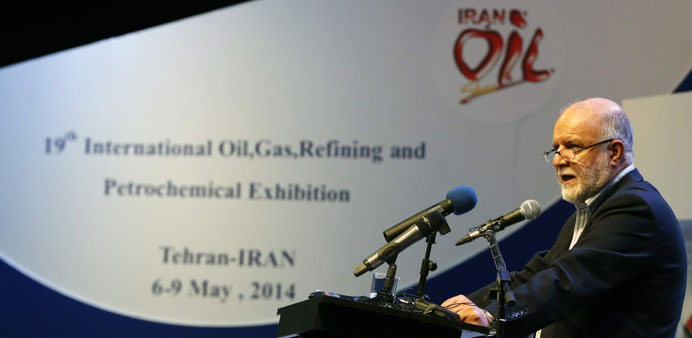Iranian Oil Minister Bijan Namdar Zanganeh speaks during the opening ceremony of the 19th Iran Oil, Gas & Petrochemical International Exhibition in Tehran yesterday. Some 600 major energy companies from 32 countries are taking part in the annual international event.
Iran’s oil minister robustly defended the country’s production capabilities yesterday and said if sanctions are lifted foreign companies would mostly be confined to a supporting role.
With some of the world’s biggest oil and gas reserves, the industry is the cornerstone of Iran’s economy, but it was heavily hit by an American and European embargo on the energy and banking sectors in 2012.
Major energy firms have since left or been stifled from doing business because of economic sanctions imposed over the country’s disputed nuclear programme.
With high hopes of an end to the decade-long nuclear dispute between Iran and the West, around 600 foreign companies registered for the International Oil, Gas and Petrochemical Refining Exhibition, three times more than last year.
In a 40-minute speech that kicked off the fair, Oil Minister Bijan Zanganeh talked up Iran’s “resistance economy,” but said it did not mean the country had to be isolated.
“We are ready to engage into contracts with domestic companies,” he said, stating that the Islamic republic is “open to the outside,” for investment and technology.
However, a simultaneous English audio translation of some of Zanganeh’s remarks, heard by most of the visiting delegates, appeared more blunt.
“We can work even with sanctions. This has already been proven. There is no need to wait for the foreigners,” he was quoted as saying.
Iran said last week that it intended to cancel a contract with China National Petroleum Corp, citing the latter’s failure to fulfil output requirements.
One Western businessman, who shook his head in surprise at the end of the oil minister’s speech, said: “From what he said it looks like Iran is self-sufficient, which left me thinking why are we here?”
Since an interim agreement with the P5+1 - Britain, China, France, Russia, the US and Germany—came into effect in January, Iran has been allowed to maintain its oil exports at around 1.2mn barrels per day.
Despite such numbers being higher than in recent years, Iran’s oil exports are a fraction of what they were before sanctions—the country was shipping 2.5mn bpd of crude abroad in late 2011.
Zanganeh said that his approach towards developing the oil and gas sector was based on an assumption that sanctions would not be lifted.
“If they are removed however, our job will be even easier. We can accelerate our activities,” he said, announcing plans to increase production capacity to allow an extra one million bpd within four years.
President Hassan Rohani and the minister have said in recent months Iran would benefit from the investment and technology transfer that international oil companies can deliver.
Ali Mowjoudi, managing director of Behtam Oil, which was formerly French oil giant Total’s joint venture partner in Iran, told AFP the mood was positive.
“About one year ago Total, because of the pressure from the US, was forced to leave Iran,” he said.
“With the changing political situation and the negotiations between Iran and the European Union countries we hope Total will come back soon.”
Iran and world powers are preparing for a fifth round of talks in Vienna next week aimed at a long-term deal on curbing Iran’s nuclear activities, which the West has long suspected include a covert military component, charges vehemently denied by Tehran.
Nezhat Mahbod, the managing director of Asia Instruments, a metering system manufacturer, said the foreign role was likely to be confined to technology transfer and finance.
“That is the opportunity for the foreign companies,” she said.
Iran has the world’s fourth highest oil reserves and the second highest gas deposits, behind Russia.
Hatef Haeri, an energy expert with the ICG consultancy group, said this year’s stronger foreign presence at the fair and Zanganeh’s remarks indicated better conditions for deals.

